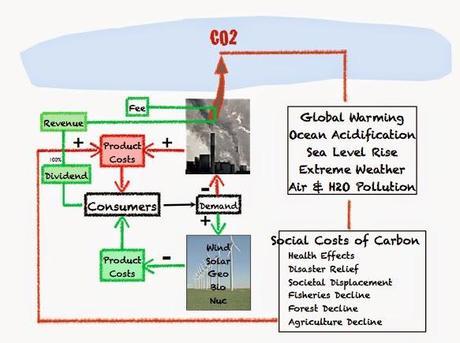by By Steven Ghan and Alex Amonette
Much as we may hate to admit it and don’t want to think about it, our burning of fossil fuels and releasing carbon dioxide into the atmosphere increases the greenhouse effect.
This results in climate change. It costs us. Local costs include the loss of agriculture in the Yakima Valley as less summer snowmelt is available for irrigation because more winter precipitation falls as rain in a warmer climate. National costs include the billions of dollars the U.S. government spends annually on imported oil and subsidies to the fossil fuel industry, and the trillions of dollars of property value that will be lost as sea level rises, subsidized by National Flood Insurance.
The costs keep rising, and are rising with interest. The costs of climate damage are higher than the costs of reducing greenhouse gas emissions. As time marches on, it will only become more and more expensive to pay for these costs and mitigate these effects.
The administration is moving ahead with EPA rules to cut carbon dioxide emissions at power plants and the Supreme Court has already upheld EPA’s authority to regulate carbon dioxide as a pollutant.
Most of the solutions, such as cap and trade, proposed to mitigate global warming involve an economic penalty. As an alternative, a number of conservatives, like former Secretary of State George Shultz, are urging fellow conservatives to support a market-based approach as an insurance policy to solve the problem by using a revenue-neutral carbon tax.
In this system, as proposed by Citizens’ Climate Lobby, a $15 per ton fee is placed on fossil fuels — coal, oil, and gas — at their source — well, mine, port of entry/refinery. There are about 2,000 entities involved at this point on whom the fee is placed. The fee rises $10 per ton per year annually in a predictable manner until we reach a safe level of emissions. Then, 100 percent of the revenue is returned to every American household. Not one dime goes to the government. Administrative costs are miniscule and no new bureaucracy is created. Domestic manufacturers and producers are protected through a border tax adjustment.

The Citizens' Climate Lobby Fee & Dividend Approach
The American people get a monthly dividend check or automatic deposit in their bank account. This provides cash to pay for any price hike in fuel costs. We will also have more money to spend on food, insulation, a more fuel efficient vehicle, health care, etc.. By 2025, if this system had been implemented in 2015 each household would have $300 a month as a steady dividend.A study commissioned by CCL showed that the economy would grow, millions of jobs would be created, thousands of lives saved, emissions would be reduced and we would begin the gradual transition off of fossil fuels onto low- or zero-carbon energy sources that will eventually help us stabilize our climate system.
Each of us would have an incentive to reduce emissions because the taxes we pay decrease as we use less carbon energy. Other countries would have an incentive to reduce emissions because the border adjustment depends on whether they tax carbon energy.
In 2008, British Columbia began a carbon tax, with the revenue returned to citizens through lowered income taxes. A new peer-reviewed study reported on British Columbia’s emissions and economy through 2012. The results are impressive. Polls show that public support for the British Columbia carbon tax has grown to 64 percent.
We can do the same in the United States. Because CCL’s carbon fee and dividend is revenue-neutral, it offers the most effective first step for us to both stabilize our climate and stimulate our economy. It beats cap and trade and government regulations.
Please contact our representatives. In the 4th District, Rep. Doc Hastings; In the 5th Rep. Cathy McMorris Rodgers, in the 8th, Rep. David Reichert. Ask them to enact the Citizens’ Climate Lobby Carbon Fee and Dividend legislative proposal now. We reap what we sow.
Steve Ghan is a climate scientist. Alex Amonette is a trained geologist and chemist. They are volunteers with the Tri-Cities Chapter of Citizens Climate Lobby.

